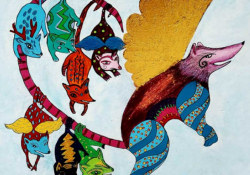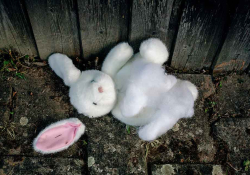African immigrants have permeated the Eurozone in recent years, legally and illegally, in search of economic opportunities among the demographically aging populations of the north. In Austrian writer Lisa Lercher's story, the preoccupation of an aging woman with an illegal alien leads to a grisly form of happiness.
Good things come to those who wait. That's what my mom always used to say. And she was right; I understand that now. I never used to believe it, because I'd already had so many bad experiences. And I tried plenty of things, let me tell you. The parish café, personal ads, the Internet—my niece had to help me with that. I even applied to go on my favorite TV dating show. I practiced introducing myself in front of the mirror. And I bought a new outfit for it. All for nothing, as it turned out. I was turned down. But at least I got a letter wishing me all the best. That's something, I guess.
And then one day, he was at my door. Just like that. Like in a fairy tale. I remember it exactly: there was a knock at the door, and I thought, Who on earth can it be at this time of day? I was still in my bathrobe, hadn't done my hair, and was on my first cup of coffee. I like to take things slow on Saturday mornings.
And there he was, grinning at me. The whitest teeth I'd ever seen in my life. Of course the skin color always adds to the effect. Black as ebony, like Snow White's hair. But that smile. I immediately knew there was something special about him. He was polite, too. I like that. Even though his German wasn't the best, he made an effort. You have to give people credit for that, even if they are foreigners.
His carvings were nice, too. Handmade, he said, in his tribe's tradition. He was selling them to pay his way through college, he said. And that he sent part of the money back to Africa, to help his old parents and his seven siblings. Family ties are still strong down there. They probably don't appreciate how important that is.
I apologized for my appearance and offered him a cup of coffee. Of course I didn't invite him in—he was a stranger, and you hear all sorts of terrible stories these days. Although he didn't look like he could hurt a fly, with those warm brown eyes and that kind smile. No, I'm a good enough judge of human nature at my age.
We chatted about this and that. Time flew by, and I bought two of his carvings. It was my sister-in-law's birthday the following month and I needed a present anyway. I knew she didn't like dust catchers, but what do you give people? Everyone has everything they need these days. And anyway, it would be payback for that hideous crystal vase she had given me. I've thought about "accidentally" dropping it, but that would be a waste. Things cost money, after all.
In the end, I told him to come back the following Saturday. For lunch. That sort of thing makes more sense than donating money to an aid organization—you never know where that ends up, right? Apparently, the people who run these outfits use our money to fund their luxurious lifestyles. And those who actually need the money are left to their fates. That's life: bad. But that's the way things are, and there's nothing we can do about it.
Saturday, I told him. Because I only use the summer house on weekends. I go out there to enjoy nature. I spend my vacations there, too. It's not worth it during the week—too much trouble to get to work. Plus, you can't heat the place properly in the winter, and I would have to shovel snow. And with the amount of it we had last winter . . . no, it's much more convenient to live in town. It only takes me ten minutes to get from my apartment to the office. I was lucky to find the place, right in the center. You can even see the museum from the roof—both museums; they face each other, after all.
He brought a coconut cake. A traditional recipe from his country, he said. He told me that it was normally served on banana leaves, but that he couldn't find any here. Plates will do just as well, I said. I served chicken, because I saw a program on TV once that said that they ate a lot of chicken down there. Even the sick chickens, because bird flu is so hard to detect, and they think it's all right as long as the meat is cooked. They have a different attitude to food. Here, people throw so much away. You only have to look in people's trash cans. All that waste—it's enough to break your heart.
He liked it. The rice too. Helped himself to seconds and thirds. I was afraid I wouldn't have enough. No wonder; if you haven't had a proper meal in months, you eat as much as you can when you get the chance. It was the same here during the war. That's what my mom used to say.
Then we chatted. He talked about his home country, and I talked about my life. I even told him about the men I'd been with, and why it had never worked out, and that I would have liked to have children. I'm not usually like that. Talking about personal things, I mean. It must have been him—his openness and naturalness. It's kind of true—they are more unaffected, closer to nature. I certainly don't mean that in a racist way.
He invited me to a drumming festival the following week. Impressive. So hospitable. People around here could take a leaf out of their book. I particularly liked the double-fried beef and the plantains. Of course I paid for everything. He was a poor student, after all, and you shouldn't take advantage of people.
He brought me a CD, copied by one of his friends. African music. I tied an old tablecloth around my hips, like I saw the black women do at the festival. He laughed and said that it suited me. And then we danced. A late night, but it didn't matter because it was a Saturday.
At work, they told me how well I was looking with my new haircut and asked me if I'd lost weight. I acted mysterious. Because it was none of their business. That's why it's called a private life, right?
I lived for the weekends. I'd never looked forward to public holidays so much in my life. Especially the ones that fell on a Thursday, because then I got a long weekend off. The Natural History Museum is open on those days, but that doesn't affect my work, which is pretty flexible, except when there are special exhibitions. That can be stressful, because there are sometimes special exhibits that need to be patched up. Storage damage, wear and tear. That's normal in my line of work. I don't mind. I enjoy my work. I liked biology at school and I've never regretted taking this job.
It was always going to happen at some point. Of course I thought about the age difference. He was almost young enough to be my son, after all. But you can't choose where Cupid's arrow will fall, right? I felt years younger around him. He accepted me the way I was. I wouldn't have felt that way with a man from around here. And I know what I'm talking about, believe me. My goodness, we were in love. We spent a whole weekend in bed. I'd never known how nice that can be.
He didn't tell me that he was an illegal immigrant in Austria until later. And that he had made up the story about his parents and siblings. He doesn't even know where his family is. They fled after the change of power. Otherwise they would have been slaughtered with machetes. He'd paid a smuggler to get him to Italy and then made his way to Austria. Because he'd heard that black people have it better here in Europe. But since then, he had learned that life is bad everywhere if you don't have a residence permit.
I also found out that his name wasn't Elias, but Noah. Oh well, at least you stuck to the Old Testament theme, I said, and laughed at my own joke. He didn't find it funny. They take religion much more seriously down there.
At first he wouldn't tell me what he'd done with the money I'd given him for his studies. Never mind, I thought. But eventually he told me that he had used it to bribe people not to report him to the immigration authorities. Awful, isn't it? But there will always be people who take advantage of other people's misfortune.
His greatest fear was deportation. Being handcuffed and gagged and put on a plane to Africa. When he talked about it, his eyes would become big and round and there would be beads of sweat on his upper lip. I would pull his head against my shoulder. Once he even sobbed. It brought tears to my own eyes.
My neighbor is a real busybody. She innocently inquired about the nice young man who was in my garden so often. Fortunately, she went off to spend the summer with her daughter in Germany. But I was really worried about what would happen in the fall. I wouldn't put anything past her. She's the sort of person who would have denounced Jews back in Hitler's time.
But that's not how things played out. He was almost caught in a raid. He was so upset, his face was almost gray. It's hard to imagine that their faces can go gray, but when you've known someone for a while, you start noticing these things. And then he told me that it wasn't the first time that he had escaped by the skin of his teeth. If he wasn't such a fast runner, they would already have caught him. My goodness, he was so upset. He said his luck was bound to run out at some point.
Then a friend told him that things were better in Sweden. He asked me if I could imagine moving to Sweden with him. Emigrate, me? A civil servant? Live underground, like him? How would I get by? It's not easy to get a job at my age.
It made me sad. I didn't like the thought that he would leave me, and all because of society. For the first time in my life, I got really angry, at the government and the populist newspapers and all the others who make it so difficult for people to be happy.
In the end, it was a panic decision. I admit that. But what happened happened. It had to be done quickly. And looking back, it was a good decision.
We had chicken and coconut cake, like on our first evening. And beer. Champagne would have been more fitting, but he doesn't drink that. I bought Guinness especially—his favorite beer. Tastes like cold coffee to me. But he likes it, and that's the main thing. It's also bitter, so he didn't taste the tablets.
He fell asleep slowly, so gently. I stroked his head and sang to him. A lullaby and then a hymn, the only one I know. Because he likes religious songs so much.
I had borrowed the tools from work. They never check up on us, and I had taken the chemicals a small amount at a time. I'm sure no one noticed. I asked a neighbor to take care of the summer house. I told him I couldn't go because I wasn't feeling very well.
It was a lot of work. Even though I had stuffed whole lions before. The most difficult thing was his smile. I don't know what I would have done without the photo. . . . And the eyes, of course. That warm glow. Almost impossible. But with the right lighting, the effect isn't bad.
It was also hard to decide whether to have him sitting or lying down. I went for the sitting option in the end. That way, he can sit next to me on the sofa and we can watch TV together or I can read to him.
Last week there was a report about the Congo, about the massacres and the genocide. Terrible images. I heard his voice deep down inside me, telling me that he was grateful for saving him from that sort of thing. And that he loves me.
I'm planning to sell the summer house. It's a shame. But I can't take him out there with me. And to be honest, it's much nicer to be at home with him.
I also invented a new game. For those evenings when there's nothing good on TV or when we run out of things to talk about. I call it "forty-three-year-old woman seeking . . ." I pretend he is the audience and I am telling him about myself and what I expect from life. Like I would have done on the dating show, which I still watch every week. My name is Erni and I am looking for a man. What kind of man? Reliable, friendly, and quiet. And faithful. The color of his skin doesn't matter, but he should have a heartwarming smile. That's what I want. Particularly in times like these.
And then we are happy because we have already found each other, without the dating show. And there is no doubt that the relationship will last and that we will stay together. At least if I have anything to do with it. And I can almost hear him.
Yes, we'll stay together. The two of us.
Forever.
Translation from the German
By Laura Ackerman










